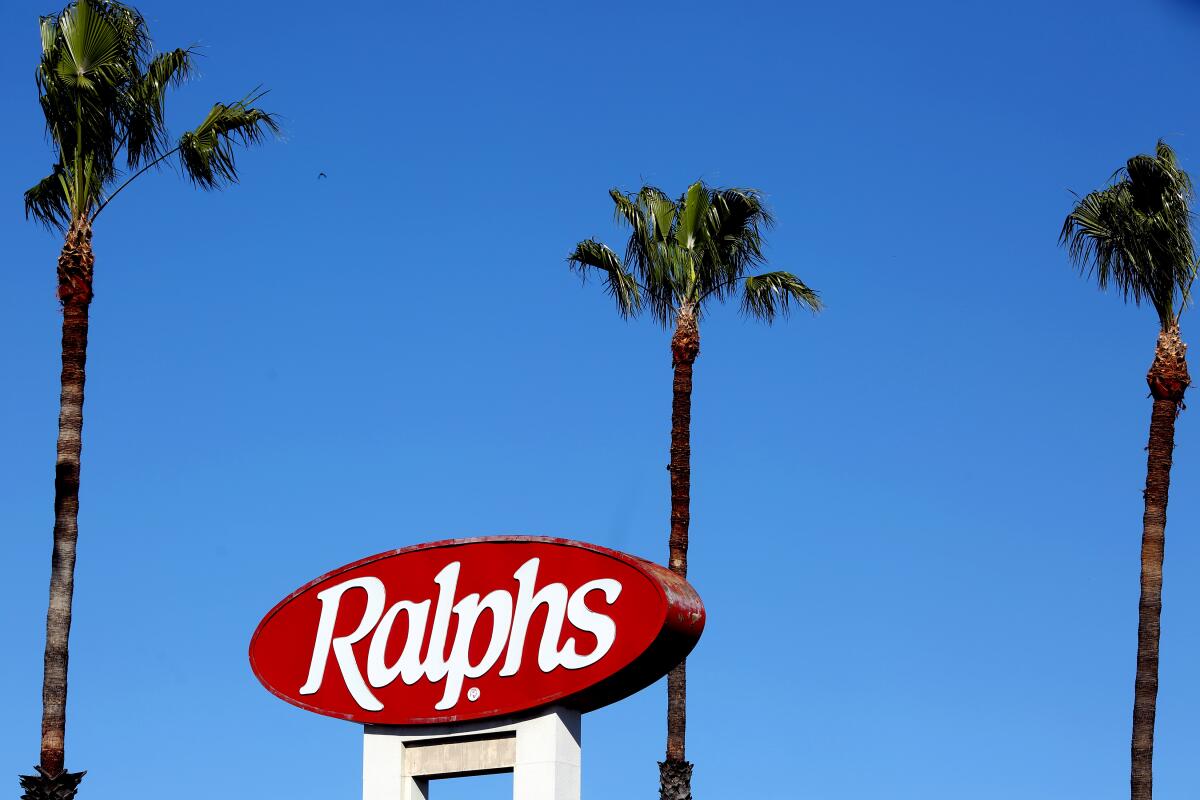A new front opens in Southern California’s grocery store labor dispute: TikTok

- Share via
Labor disputes are as old as capitalism itself, but the battlefields they play out on are continually evolving.
That’s a lesson that Ralphs learned this week when — after grocery workers across Southern California voted to authorize a strike — a digital activist threw a TikTok-shaped wrench in the chain’s efforts to preempt walkouts by hiring temporary “scab” workers.
“Let’s say you’ve always wanted to work at a Ralphs,” said activist Sean Wiggs, posting under the screen-name Sean Black, in a viral video he uploaded to TikTok on Tuesday. “Let’s say you’ve always had a dream to submit a — or multiple — application to this specific Ralphs store.”
Wiggs then directed viewers to a computer script he said would, with just a few clicks, flood a Ralphs hiring portal with fake job apps. The script has facilitated more than 25,000 such submissions, he told The Times.
“This way you can fulfill your dream of always working at Ralphs while also punishing a company that’s union-busting,” Wiggs cheekily remarked in the video, which has now been viewed more than 35,000 times and was first reported on by VICE. “Best of both worlds!”
The job page in question no longer seems active; a QR code directing applicants there leads to a gray page and the message: “This job cannot be viewed at this time. It has either been deleted or is no longer available.” Wiggs said in his TikTok video that the site lacked basic protections against automated spam attacks such as email verification or anti-bot Captchas.
Buying a home for the first time is one of life’s sweet milestones.
“It’s disappointing that these failed attempts were aimed at disrupting [a community’s] access to fresh food and essential items,” John Votava, a representative for Ralphs, said in an emailed statement. “To be clear, we are focused on coming to [an] agreement with [the United Food and Commercial Workers union] that would eliminate the need for temporary workers.”
Votava did not say why the job site went down or whether it would be back up at any point in the future, but said that the company has “successfully hired temporary workers for all locations.”
Tens of thousands of union members voted to authorize a strike if their wage demands aren’t met during impending contract negotiations. Alongside Ralphs, a subsidiary of Kroger, other chains that could be subject to the strike include Albertsons, Vons and Pavilions.
“Technology gives the community another way to stand in solidarity with us and we appreciate the support,” Ashley Manning, a cashier at a San Pedro Ralphs store and a member of the employee bargaining committee, said in a statement emailed to The Times by a union spokesperson. “We hope Ralphs gets the message to stop their anti-union behavior and negotiates a fair contract.”
This is not the first time social media has been leveraged as a tool for labor activism. Warnings about which picket lines to avoid crossing spread rapidly on Twitter, and digital communication tools can prove invaluable in unionizing workplaces — especially ones that don’t exist in a single, centralized office. Social media has also helped gig economy workers on platforms such as DoorDash organize strikes.
In summer 2020, TikTokers used the app to coordinate reserving tickets en masse for a rally that then-President Trump was planning, in hopes that the venue would be left mostly empty when they didn’t show up to claim their seats. The event had a lower-than-expected turnout, although it’s hard to trace that outcome to any singular activist effort.
Some trolls also use bot scripts to get their enemies suspended or banned from TikTok by flooding the platform’s complaint system with content violation reports.
Wiggs is a veteran of this sort of computer code activism; his anti-Ralphs tool is one of several such scripts he has developed.
He said he has coded similar programs to support organized labor actions at Kellogg, where workers walked off the floor of some of the company’s cereal plants in late 2021, and Starbucks, where workers have gone on strike this year in cities such as Kansas City and Denver amid a chain-wide unionization push. He also coded a script to flood a website with fake reports of violations of Texas’ new anti-abortion law; the law promises bounties to those who report others for obtaining or aiding abortions.
This sort of “digital labor activism” is on the rise and will only continue to get more popular, Wiggs added. “It allows people like myself who are not in the area of the strike, and not directly involved in it to support from wherever we are. That is the power that the internet provides to people who want to make change.”
Even though the initial Ralphs job listing is now offline, Wiggs’ work continues. Using QR codes he found on Reddit’s famous “anti-work” forum, he added two more store-specific Ralphs application portals to his code base, he told The Times.
As of midafternoon Wednesday, one of those two portals appeared to be down. For now, the other remains up.








